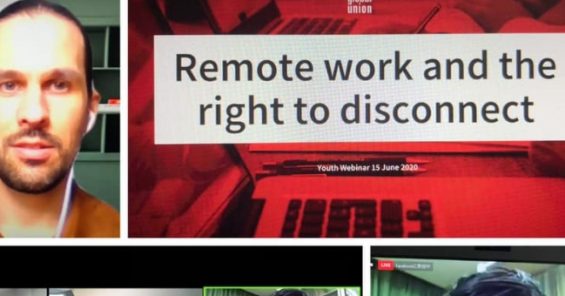Millions of workers worldwide have been plunged into teleworking as countries across the globe have imposed lockdowns and social distancing measures to prevent the spread of the coronavirus.
Statistics show that in the US alone, 16 million people started working remotely due to Covid-19. In Japan, 83.3 per cent of large businesses and around 51 per cent of small-to-medium businesses introduced remote work as a result of the pandemic.
The consequences of the sudden switch to teleworking as well as the right to disconnect were the subject of the first of three webinars by UNI Youth on 15 June.
Some 116 participants from UNI affiliates joined the discussion via ZOOM, which was also live streamed through Facebook, gaining more than 1.6K views in 24 hours.
Participants spoke of their unions’ efforts to fight for the right to disconnect, as well as push governments to adopt laws and policies to act as a framework for teleworking.
The panellists included Alex Hogback, Director of UNI Professionals & Managers; Sofia Scasserra from Faecys, Argentina; Seiji Kugimoto from Nipporo, Japan; and Jorge Maeso Carmona from CCOO, Spain.
Speakers addressed issues such as the definition of teleworking the invisible and invisible effects of teleworking, including increased harassment and cyber bullying, particularly against women, the impact of teleworking on young workers and the need for a union response.
“We have to have remote working agreements on a voluntary basis, some people don’t want to work from home, or don’t have the right environment to do so. The increased costs of electricity and internet also have to be taken into account,” said Jorge Maeso Carmona from Spanish union.
“The future will not be the same. We will not be the same. It is time we start to get ready for what comes next and as unions, we have a crucial role to play. This webinar has shown us the importance of union work and strong collective bargaining to protect and ensure the rights of all our workers,” commented Marta Ochoa, Director of UNI Youth.
Find out more about the right to disconnect here.


